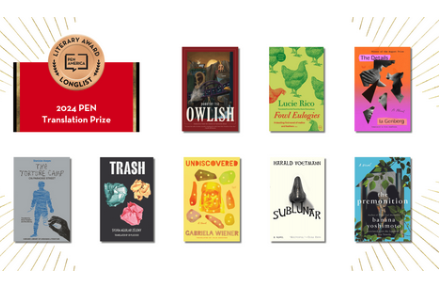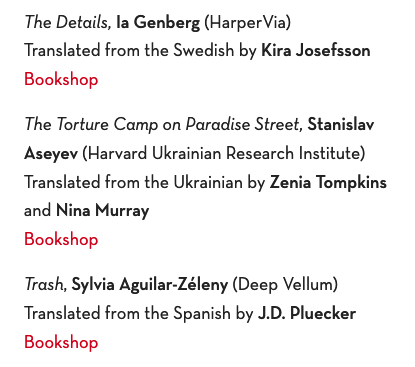Judges' Statement on the 2024 Pen Translation Prize
On Monday, April 8th this year, after much delay and little advance communication, PEN America announced the long lists for its 2024’s literary awards. This included the PEN Translation Prize that we, Larissa Kyzer, Hanna Leliv, Parisa Saranj, and Jenna Tang were judges for. At the time we were nominated for the judging committee, we were proud to have the opportunity to serve the literary translation community in this way, and excited for the chance to read so many fantastic translations by so many talented colleagues. There aren’t, after all, many high-profile venues in which literary translation is honored.
We judges are still proud of our work together, which was affirming, engaging, and uplifting. We are incredibly proud of our long and short lists. The books we selected were translated by true craftspeople, who enliven our profession and our art with their work. Our lists are a celebration of fresh voices, exciting aesthetics, bold translation choices, and courageous narratives. These stories stand as witness to the cruelties that people have, throughout time, visited on their fellow beings, as well as the possibilities of rebellion within suppressive social structures and of finding joy and meaningful connection in the everyday.
We are not, however, proud to be associated with PEN America at this time. Larissa Kyzer is a former co-chair of the PEN America Translation Committee and found much-needed community, mentorship, and support amongst the translators that she met in her time volunteering with PEN. Parisa Saranj has worked with the PEN America Writers at Risk program on several occasions to highlight the plight of Iranian writers and political dissidents. Jenna Tang dedicated two years to being fully involved in the PEN Translation Committee and helped organize translation-related events. Hanna is a new member of PEN hailing from Ukraine and, through her involvement, hoped to do more to raise visibility of the lesser translated literatures like her very own.
But we cannot conscience the way an organization specifically dedicated to free speech and freedom of expression, to the right of writers of and journalists to live and work in safety, has continuously withheld meaningful comment, has stifled dissent both within its ranks and at its events, and has attempted to sweep criticism and critique under the rug instead of participating in a good-faith dialogue about ways to meaningfully redress its wrongs and take a new path going forward.
While we wholeheartedly celebrate and honor the nominees for this year’s literary awards, we also want to honor the stance taken by Sublunary Editions in choosing not* to accept multiple nominations for this year’s PEN literary awards. (See the press’ full statement here.) We were delighted to read the Sublunary titles that we selected for inclusion on this year’s long list, but stand in solidarity with the publisher and the translators’ decision to withdraw from the award.
We hope that by adding our voices to those of the activists, organizers, writers, and translators who have already called upon PEN to live up to its mission to “unite writers and their allies to celebrate creative expression and defend the liberties that make it possible” we can collectively continue to push the organization toward a more robust engagement with its membership, a more respectful acknowledgement of and engagement with dissenting staff, and a more courageous fulfillment of its core values.
-Larissa Kyzer, Hanna Leliv, Parisa Saranj, and Jenna Tang





